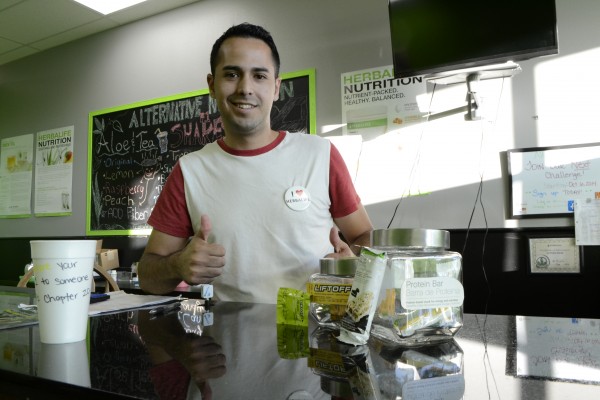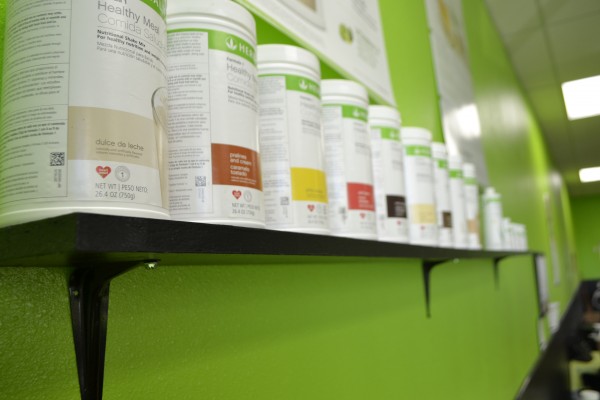EL PASO— When it comes to trying to keep bodies healthy in the fit-vs-fat wars, this predominately Hispanic border city leans toward natural solutions.
Seventy percent of residents here and across the border in Cuidad Juarez say they use herbal medicines to lose weight and treat a variety of illnesses, according to a 2010 study funded by the Paso del Norte Health Foundation.
Infographic: The pros and cons of 5 common herbal remedies
El Paso and Ciudad Juarez are essentially one urban metropolis of some 2 million residents divided by an imaginary political line. Together they make up one of the largest population centers to regularly use medicinal herbs.

Al Trujillo’s fascination with Herbalife led him to open his Alternative Nutrition club, in Socorro, Texas.
“It is definitely tied to the cultural factors especially among Hispanics,” said Armando Gonzalez-Stuart, one of the authors of the study. “There is a very rich tradition of herbal medicine use by Mexicans, Mexican-Americans, Puerto Ricans and other Hispanics.”
He says the study showed that Cuidad Juarez is noted for using crude herbs, whereas El Pasoans favor herbal pills and extracts.
Among weight loss remedies, the most commonly used herbs are kelp, artichoke and citrus peels, although their effectiveness has not been proven.
El Paso had a higher percentage of obese adults than the national average in 2010. A City of El Paso Department of Public Health report in 2011 listed 28.6 percent of El Pasoans as obese. Nationally, 27.5 percent of adults in the U.S. were obese.
Herbalife, one of the first commercial companies in the nation to broadly distribute herbal remedies, says on its website that Hispanics constitute a large percentage of its clients. The California-based company made $4.8 billion in net sales in 2013 and has more than 2.3 million independent distributors around the world, according to the company website.
Herbalife was launched in 1980 and is active throughout 90 countries including the U.S.-Mexico border region. The company says 19.2 million Americans, 8 percent of U.S. adults have tried or used processed herbs.
Spanish-speaking distributors of Herbalife’s products constituted 45 percent of the company’s U.S. sales force during 2013, a drop from 60 percent in 2011. In addition, 85 percent of Hispanics using the product rate it as good, very good or excellent.
Hispanics also join nutrition clubs – popular exercise and nutrition shops that began cropping up throughout Mexico approximately 20 years ago to promote Herbalife’s products.
Al Trujillo, a 23-year-old Socorro, Texas, businessman and distributor for Herbalife, started using their products to get more energy and help him stop eating unhealthy fast food. Trujillo took part in a three month challenge and as a result he said he lost 20 pounds. He decided to join in the business by becoming a distributor in September of last year.
With just $70 to turn his dream into the Alternative Nutrition club, in Socorro, Texas, Trujillo began selling products to his circle of family and friends and eventually expanded to other acquaintances. Trujillo now counts on 15 committed clients. He says that he does not just sell products, he helps his clients commit to a better and healthier lifestyle.
“I just liked what the company stood for,” said Trujillo. “It stands for a healthy lifestyle, an active lifestyle. I decided to go into the business for myself but also to help others. I didn’t start selling until I saw the results in myself.”

Herbalife products line the walls of a Trujillo’s Socorro shop
There are now several privately owned nutrition clubs in the El Paso-Juarez border area. Trujillo’s club also promotes and sells aloe, herbal teas, protein bars, meal replacement shakes and Herbalife products. He encourages fitness and group support by inviting members to his club to do Zumba on Thursday nights.
“You see many people think of Herbalife as just this Hispanic woman selling it,” said Trujillo. “It’s really not (that). A lot of people also think that it’s just women trying to lose weight as well. It’s a product used and sold by both men and women.”
Gonzalez-Stuart said that although some cases of Herbalife weight loss supplements products causing hepatotoxcity — damage to the liver — have been reported, the products are tested.
Studies on the U.S. National Libraries of Medicine of the National Institutes of Health, said that some reports of the product being tied to toxicity in the liver came from Israel, Switzerland and Spain. However only 53 cases were reported from the thousands of people who use the product .
“That’s really nothing. You can get that from aspirin or Tylenol,” Gonzalez-Stuart said. “It’s a safe product. This can happen in the general population to anything — look at peanuts, I can eat peanuts with impunity and another person can go to the hospital.”
For looking up safe products, herbal remedies, Gonzalez recommends doing research on the ingredients used through different scientifically based websites.
“Just because it says it’s all natural doesn’t mean it’s safe,” Gonzalez said. “Our bodies react to everything differently.”
Losing weight within a safe time frame is what is regarded as effective by medical professionals and nutritionists. Often weight loss products are advertised as a quick fix, which is considered unsafe.
Illegal herbs like the candlenut tree (nuez de la india)and yellow oleander (codo de fraile), which Gonzalez said are popular among Hispanic women, are promoted through word of mouth and even on the Internet. They can result in quick weight loss but also carry the risk of severe digestive problems, cardiac arrhythmias, intoxication and even death.
Weight loss should always be done with effort and the right way, Gonzalez warned.
“You only have one body to live in,” said Tujillo. “Only you can take care of you, feel good, be healthy and your future will thank you.”
For more information regarding herbal safety visitwww.herbalsaftey.utep.edu
